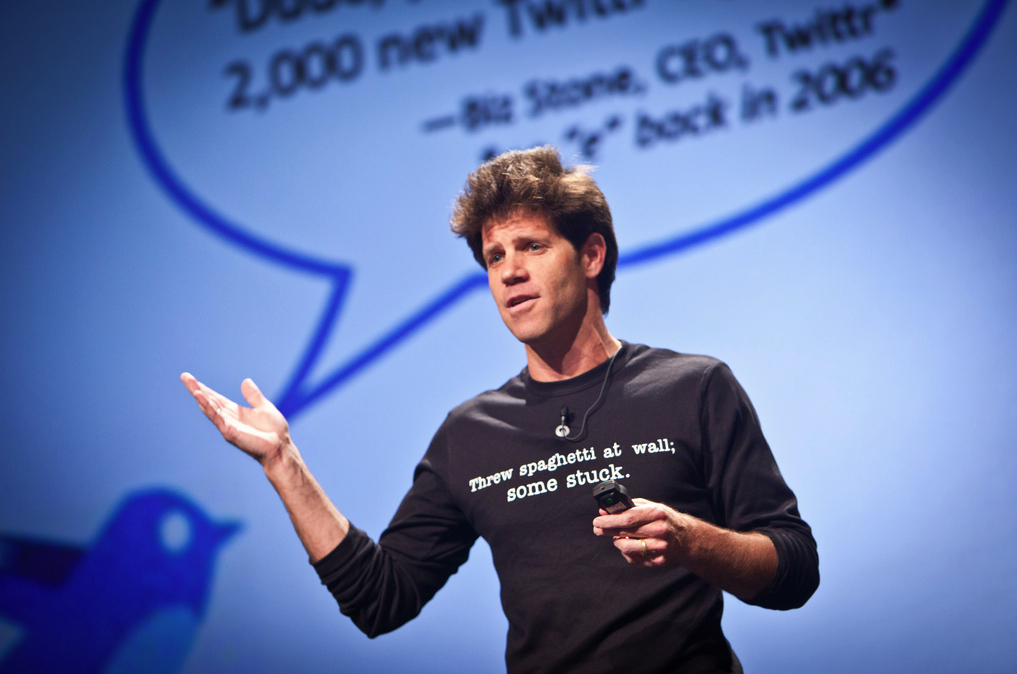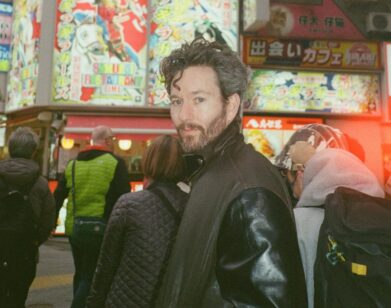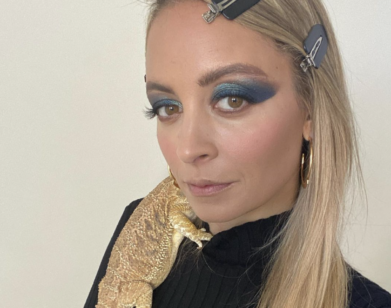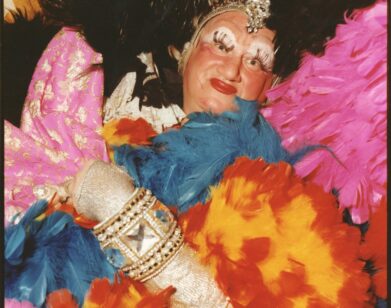Larry Smith, in More than Six Words

ABOVE: LARRY SMITH. PHOTO COURTESY OF KRIS KRÜG
We’ve all had life-changing moments. And they’re rarely picture-perfect. In The Moment: Wild, Poignant, Life-Changing Stories from 125 Writers and Artists Famous & Obscure (Harper Perennial), editor Larry Smith attempts to curate and classify these often messy, emotionally fraught instants. Smith, the founder of Smith Magazine and the Six Word Memoir, has a good background to do it. Smith bravely takes the lead, confessing to a teenage eating disorder in his introduction. Indeed, Smith’s mission seems to be marked by publicly exposing private revelations, a cathartic way to let go of pain but also provide cautionary tales to those who may be going through similar strife.
Like life, the tales in The Moment range from hilarious, to tragic, to run-of-the-mill, ordinary feelings we experience everyday, but therefore cannot see the profundity of. Contributors range from Jennifer Egan, Dave Eggers, Judy Collins, and Elizabeth Gilbert, to younger talent like Mira Ptacin and Ashley Van Buren, to first-time authors and teenage students who provide fresh, sassy short nonfiction. We spoke with Smith about skydiving and the drug trade versus baby showers, the power of public confession, fame versus obscurity, and his grandfather—whose story started it all.
ROYAL YOUNG: How do you qualify a moment? What is it?
LARRY SMITH: It’s not necessarily an instant where something is changed, but it’s something that happened to you either internally or externally, a thought, accident, email, or tweet you read that changed you later. It’s about what happened to you afterwards, what happened next. A great example is this weird moment in Jennifer Egan’s piece, where, rereading her journals, she realized she always dreamed of being a writer. She didn’t know it while the moment was happening to her.
YOUNG: You stole my next question. Do you know it’s happening while it’s happening?
SMITH: [laughs] No, you don’t always know it’s happening. Hindsight is an amazing thing. You also can’t force a moment. Like you can’t just skydive, maybe you’re changed before you even jump out of the plane. And I don’t want to hear about babies, bar mitzvahs or sweet sixteens. They’re almost too easy and too common. Though Rebecca Wolf had some very interesting things to say about motherhood. I thought she’d write about being a hipster mom and having a kid so young and how it changed her, but instead she wrote about the first day she checked her son into kindergarten. My wife, Piper Kerman, wrote “Orange Is The New Black” about a year she spent in prison. So when I asked her to write a moment, I kind of thought it would be this scene in her book where she has a margarita with this glamorous older woman who lures her into the drug trade. But instead she wrote about being on a dirt road in New England at age fifteen and her cool uncle was like, “Wanna drive?”
YOUNG: Well, speaking of hindsight, it seems to me that both of her stories have similarities. They’re both about this older figure who’s cooler and edgier, pushing the protagonist to do something outside their comfort zone, but which is also wildly enticing.
SMITH: That sounds perfect, actually. That’s so right on.
YOUNG: Why do we find it so crucial to go back and rehash, retell, re-explore our own lives?
SMITH: Moments and memoir are a form of therapy. I think making sense of that stuff in a public space like Smith Magazine is really interesting. When you release a secret, even anonymously, you’re actually letting something go which is very therapeutic. I took a writing class with Daphne Merkin a while ago at the 92nd Street Y and she called me an unreliable narrator. She said “You’re not giving up enough. I don’t think you’re lying, I think you’re holding back.” She was right.
YOUNG: You’ve chosen a variety of contributors for your book, both people who are incredibly famous and people who are very obscure and this is their first and very exciting time being published. Is there more to learn from some people’s narratives than others?
SMITH: I think that’s a fair point. Some of the moments are reminders of things we all know, like, you need to take chances, live for today, go with your guts.
YOUNG: I would also surmise that the take away from a notable public figure versus an unknown person would just be very different.
SMITH: Definitely. We have a lot of teachers who use Smith Magazine in the classroom, and so we have a few teaching stories in the book. One is by Dave Eggers, who wrote about students’ futures coming to life and sure, hearing about it from him is a little bit different. It’s more effective.
YOUNG: Are you saying that because we publicly know the larger life story behind the moment, it gives it more weight?
SMITH: It does. Someone like Melissa Etheridge, we knew was probably going to talk about having had cancer. I figured it would be some “I will push on” kind of theme, which is great. But it wasn’t just about that, it was also about doing the Grammy’s not wearing a wig. When she made that decision, she decided, “I will go with the cancer, I will be the face of cancer, and I won’t turn back from that.”
YOUNG: Why do we remain so fascinated by other people’s lives and what do they have to teach us?
SMITH: People are inherently interesting. Everyone has a story. Origin stories are really important, both for individuals and organizations. My grandfather who lived in a small town in Jersey, in about 2002, I realized I didn’t know his full story. I knew he came over from Russia and grew up in Philly, but I didn’t know all the details and I was kind of embarrassed by that. So I had a video camera and asked him for his story. He said, “My story? Who would care about that?” Then he talked for two hours.
YOUNG: I’d love to just go back to why it’s so important for us to tell these stories to each other, publicly, out loud.
SMITH: When you release that moment, that revelation, you learn something about yourself. And when it’s out in the public, you help the world understand each other. It’s a major in storytelling with a minor in therapy.
THE MOMENT IS OUT NOW. YOU CAN FIND SMITH MAGAZINE ONLINE.






